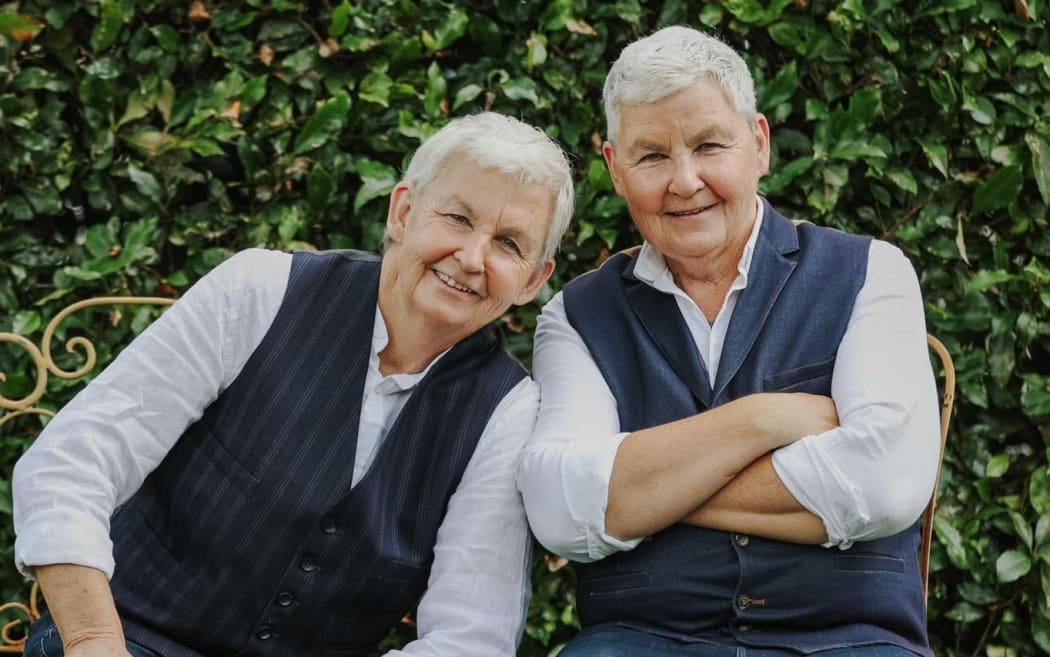
Entertainers and sisters Jools and Lynda Topp, aka the Topp Twins Photo: Topp Twins / Facebook
For over 40 years, twin sisters Lynda and Jools Topp have performed as the joyfully anarchic and comedic country music duo The Topp Twins.
Lynda and Jools – who are now 65 and live respectively in Methven and Auckland – say they feel connected by what they call a "golden thread".
If they haven't spoken on the phone for a couple of days, "a little tug happens and you think I've gotta ring Jools now," Lynda tells Kim Hill.
"If you did have a golden thread that you were connected to someone with, you wouldn't want to try and break that thread, would you?" adds Jools.
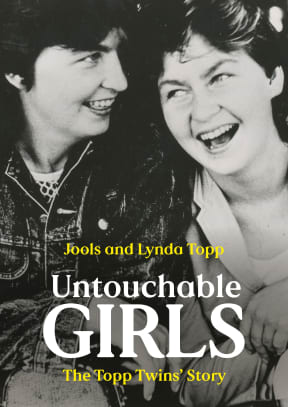
Photo: Allen & Unwin
Untouchable Girls, a book full of photos, anecdotes and memories, tracks Lynda and Jools' lives from their "lovely childhood" growing up on the family farm in the Waikato with their mum Jean, dad Peter and older brother Bruce.
Jean and Peter had incredible insight into parenting the "two wild children" that she and Jools were, Lynda says.
"They never discriminated between the jobs that Bruce and Jools and I had to do. There wasn't girls' jobs and boys' jobs.
"Jools and I were picking up hay and driving tractors and fencing and helping Dad all the time. We were pretty much outside all the time. And Bruce was inside, helping Mum and doing floral arrangements and listening to records. That was what he wanted to do.
"In those early years were all heading towards our chosen sexuality but nothing was ever a problem for Mum and Dad, to have three kids who they eventually found out were all gay.
"They were beautiful to us and so caring and so sharing."
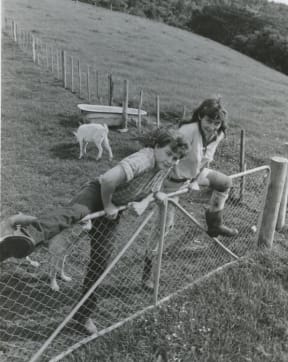
Rural radicals at Te Henga (Bethells Beach), early 1980s Photo: Anne Crozier
In Untouchable Girls, Jools recounts her mum being a "little bit horrified", though, when she discovered her young daughter, while working in a Huntley pharmacy, had developed a dependency on prescription drugs pilfered from work.
"Everyone was smoking dope, everyone wanted to have a different drug from their parents. We all thought booze was horrible, really, and so many people kept dying in car crashes. We thought 'lest just smoke dope, we're all happy when we do that'.
"I just thought I was a young cool dude, you know, and nothing could stop me… we were all trying different things way back then… I was young and foolish."
Jean Topp took action and decided that Jools was to move home and help her father milk the cows for six months.
As she loved cows, Jools says this wasn't "a really harsh" punishment and over that time she reconnected with her father.
"Dad just looked up from behind his newspaper and said 'I knew you were heading for trouble, girl. Come on, let's go milk the cows' and not another word was spoken."
In 1977, when Lynda left high school, she decided to join the army – she says partly to get a free trip to the South Island for military camp training.
Their father said Jools should go, too, and the Topp twins became one of the last female-only groups to do basic training at Burnham Military Camp near Christchurch.
The experience was like "a pyjama party with guns," Jools says, and cemented the twins' relationship.
"In some ways, it was an amazing event… where we were separated from the world but together again and we just kind of bonded."
With 28 women living and working together as a team, it felt like "a big adventure camp" to Lynda.
"It was an amazing sense of togetherness… but of course, we never really wanted to fight in a war. That was something we, later on, thought was a terrible thing ... but it was very good training for our protest days, which were going to come much later."
There was no such thing as a gay community in New Zealand in the 1970s, Lynda says.
But unlike Canadian singer KD Lang "who was famous and then came out and the shit hit the fan", she and Jools were openly lesbian when they become well-known.
"There was no dirt on us because they couldn't find any dirt on us. We'd already said what the dirt was… At that point in time 'lesbian' was a word that wasn't spoken in many country homes, I can tell you that."
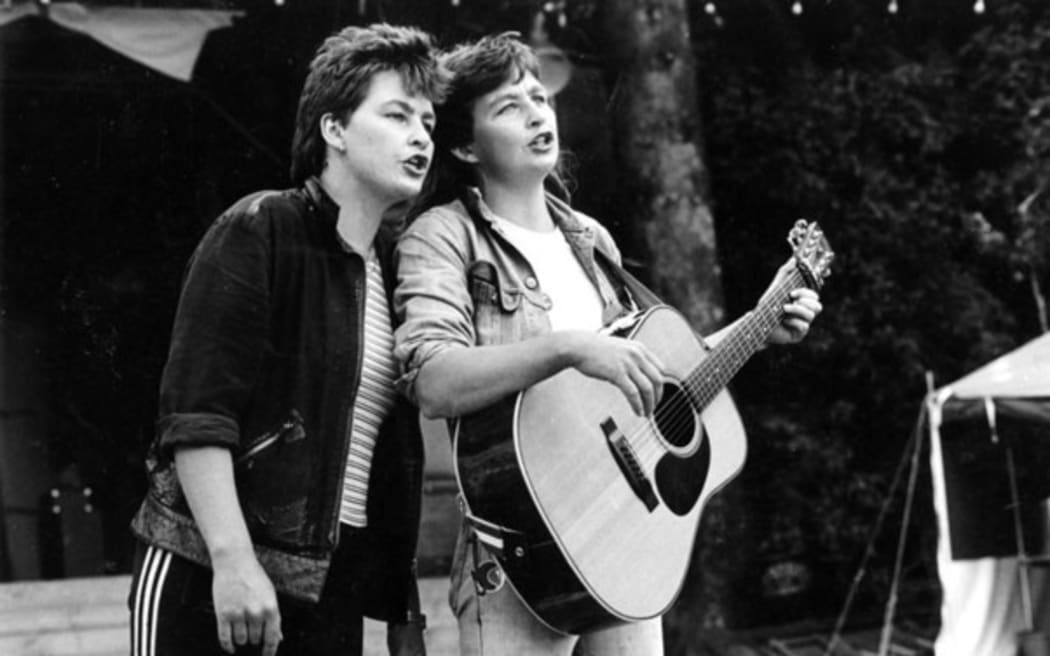
The Topp Twins in the early 1980s. Photo: 2015 Simon Grigg
By the 1980s, when the Topp Twins began singing political protest songs, Jools says that the twins had found their "lesbian family".
Their activism, such as protesting the 1981 Springbok Tour, wasn't motivated by a quest to improve their own lives but to gain equality for others they saw being mistreated.
"We wanted the Black rugby players to be able to walk in through the front door like everybody else. It just seemed such a weird thing to us… we just couldn't understand what was happening.
"We certainly didn't want a nuclear war and we wanted gay people to have a choice of any kind of partner they wanted."
- Related: How NZ Music Helped Us Ban the Bomb
In 1985, the Topp Twins sang their anti-nuclear anthem 'Radiation' at the Beehive.
Jools says that at first, her anti-nuclear stance led to her refusing radiation therapy for the breast cancer she was first diagnosed with in 2006.
Last year, though, she did receive radiation treatment on a tumour between her ribs and has also received chemotherapy in the past.
At the moment, Jools' only cancer treatment, which she says will be her final treatment, is monthly injections of the hormonal therapy drug Faslodex.
"Every four weeks, I have two big long injections in both buttocks.
"It searches out the estrogen in my body, which my cancer feeds on, and it smothers the estrogen and the cancer can't find it to eat."
The drug has reduced the size of the tumours in her body, Jools says, and although none are growing currently, cancer has spread to her lymph nodes."
Despite the build-up of scar tissue in her buttocks due to the injections, Jools is still able to ride her horse on a supersoft Italian saddle.
"Once I put my foot in the stirrup and I'm on the horse, I forget I have cancer… It's out of my head because I've gotta be focused on what's underneath me. It's a dangerous situation sometimes.
"The cancer might get me, you know. I've lasted 20 years. I'm thinking 'shit, I'm doing good'.
"I'm quite philosophical about it now because I've had a beautiful life. My life has been really brilliant and I'm not afraid of dying.
"I want to live my life as best I can at the end. I don't want to be full of chemo, that's for sure."
Watch Topp Class - a 2023 tribute concert to Lynda and Jools Topp:
Lynda says it was "kind of weird" to discover during the Covid-19 pandemic that she also had breast cancer.
"For a good many years, I had breast screening every year for a while and then every two years… and nothing had shown up at all."
When she missed visiting one of her regular visits to a breast screening bus in Ashburton, Lynda says she "couldn't be bothered" travelling to Christchurch for a screening but the nurse insisted.
"I did my lovely tittie squash and four or five days later they called and said they'd found something that was a bit abnormal."
Returning to Christchurch after a trout fishing trip with a friend, Lynda was told she had stage 4 breast cancer.
"We knew very early in the piece that my cancer was aggressive… this had grown very quickly within the last 2 years."
Lynda opted for a double mastectomy and six months of chemotherapy, but because of Covid protocols, Jools wasn't able to support her in person.
"I cried and cried and cried when Lynda rang me… I just knew what she was going to go through. I was absolutely shocked and horrified and worried for her," she says.
Halfway through Lynda's chemotherapy treatment, she discovered that was also suffering from nerve damage known as peripheral neuropathy.
"The chemo has damaged the nerves in my feet and that is now permanent.
"All my toes are numb and it feels like the bottom of your feet have a hundred needles poking into them constantly."
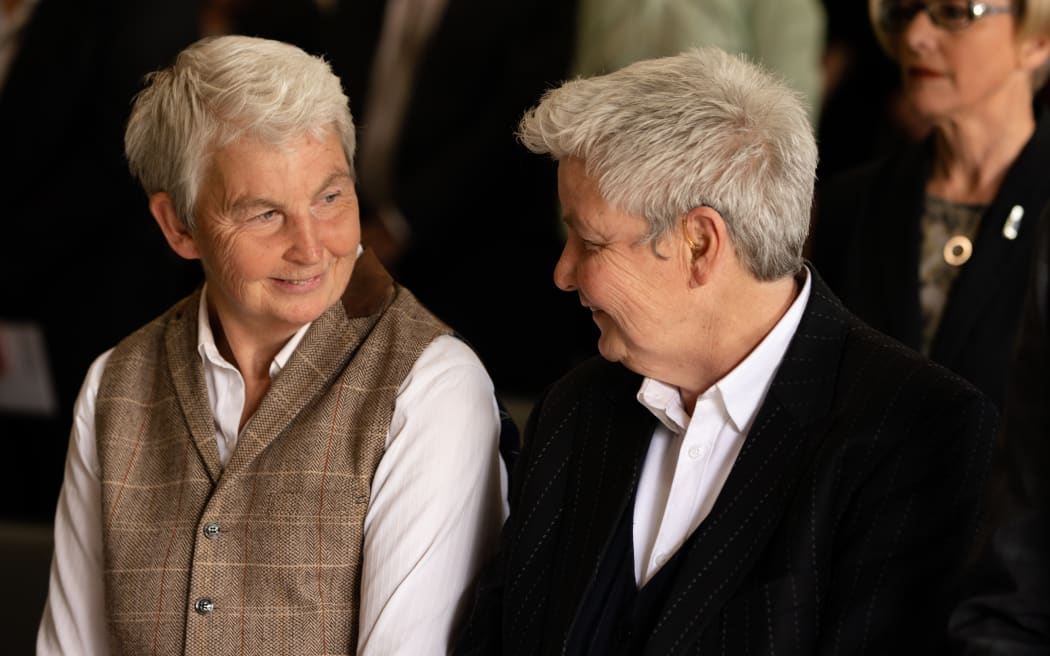
Dame Jools Topp, Dame Lynda Topp, Jackie Clarke and Chrstine Panapa have been celebrated at investiture ceremonies at Government House in Auckland. Photo: RNZ / Dan Cook
Although Covid-19 and cancer treatment have "squashed" their careers in the last couple of years, the twins have appreciated a break from performing, Jools says.
"In some strange, weird way we've never had a break. We've just performed and performed and performed and for 35 solid years, we never took a break from being the Topp Twins. In some funny way, it was great to have a rest.
"It was refreshing not to have to put on this entertainment persona, to be on all the time, just to be ourselves and to be at home, like normal people, just mow the lawns and hang out and plant some lettuce."
Lynda's illness also provided the opportunity for the twins to sit down and write their memoir, which has helped them reflect on the "charmed and beautiful life" they've had, Jools says.
She thinks the "family dynamic" – such as Tim and Neil Finn had – lends itself to authentic expression.
"New Zealand loved what we did because we did it with honesty, we did it because we loved doing it, it was pure and for us to perform just a sheer joy. And people picked up on that, they saw our golden thread.
"We gave people a chance to see something that could be funny, songs they hadn't heard before, harmonies they hadn't heard before, yodels … we gave them something that made them see love at the same time.
"Hopefully, we've changed other people's lives along the way, and that's important to us."
Songs played:
'Calf Club Day' from the Topp Twins' 1994 album Two Timing
Jools says she didn't write this song, rather it came to her in a dream.
"I dreamt the whole song in the middle of the night… it was a memory from my childhood. I just woke up one morning and there was a book with a pen next to it ... I just sat bolt upright and wrote the whole song in about 2 minutes, remembering my dream. It's not often that songs come that easily…
"It's just simple, a very simple song, but it means a lot. It's about what is precious to us… and it wasn't gold, it was the love of a small animal that you look after when you're a kid."
Lynda says that as a child she fell into a "yodel coma" when she first heard the Australian country artist June Holmes yodelling in this song: "I had been taken somewhere else by that sound…it moved me to the point of saying 'I must learn how to do that'. That was my goal as a child."
Yodelling and bagpipes are two things which don't sound great when you're learning, adds Jools, so their mum sent Lynda to the back of the farm when she was practising.
When the twins packed up their mother's house (she now lives in residential care) they discovered the family's original 'My Pinto Pony and I' record in her closet.
Years earlier, on their first tour after Jools' first cancer diagnosis, she says her only request was that Lynda perform this song.
"It's kind of a special song for both of us."
'Nga Iwi E' from the 1972 Topp Twins album Honky Tonk Angel
The Topp Twins on RNZ:
- Recipe: Camp Mother’s Chicken Soup
- Jools and Lynda tell some Topp tales (2018)
- Jools and Lynda on their cookbook Topp Country (2018)
- Jools & Lynda spin some favourite tunes during a natter with Kim Hill (2014)
- NZ Live - Topp Twins (2009)
- The Topp Twins with Kim Hill (2008)
- The Topp Twins with Kim Hill (2007)
- Jools and Lynda Topp read The Topp Twins Book (a 10-part audio collection)

